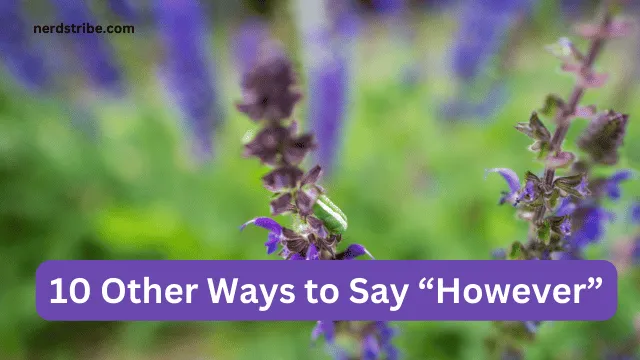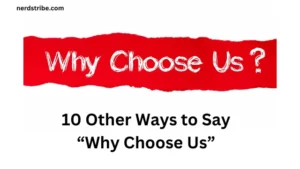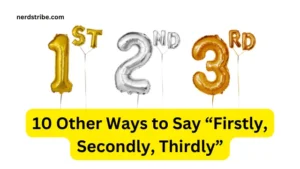Language is a tool we use to navigate through ideas, perspectives, and arguments. The word “however” is often the bridge between contrasting thoughts, helping us express exceptions or alternative viewpoints.
While it’s a useful word, repeating it too often can make your writing monotonous and predictable. Expanding your vocabulary to include alternative expressions for “however” can enrich your communication and make it more engaging.
Why is this important? Whether you’re a student crafting essays, a professional writing reports, or someone sending emails, variety in language keeps your audience interested. Using different ways to say “however” not only shows your linguistic dexterity but also keeps your writing fresh and impactful.
In this blog, we’ll explore 10 versatile alternatives to “however” that you can seamlessly integrate into your speech and writing. These options will help you articulate contrast and exceptions without losing your audience’s attention. Let’s dive in!

Contents
- 1 1. “Nevertheless”
- 2 2. “Nonetheless”
- 3 3. “But”
- 4 4. “Yet”
- 5 5. “Still”
- 6 6. “Although”
- 7 7. “Even so”
- 8 8. “On the other hand”
- 9 9. “Though”
- 10 10. “Despite that”
- 11 Conclusion
- 12 FAQs
- 12.1 Why should I use alternatives to “however”?
- 12.2 Are these alternatives suitable for professional writing?
- 12.3 Can I use these alternatives in everyday conversation?
- 12.4 How do I decide which alternative to use?
- 12.5 Can these alternatives be used interchangeably?
- 12.6 How can I practice using these alternatives?
1. “Nevertheless”
This classic alternative emphasizes persistence despite contrasting circumstances.
- Example: “It was raining heavily; nevertheless, they completed the marathon.”
- Why It Works: It highlights determination or an outcome despite obstacles.
2. “Nonetheless”
Similar to “nevertheless,” this word conveys contrast with a touch of resolution.
- Example: “She was tired; nonetheless, she finished the project on time.”
- Why It Works: It shows a surprising or unexpected result despite conditions.
3. “But”
A simple yet effective alternative for informal communication.
- Example: “He wanted to go to the party, but he had work to finish.”
- Why It Works: It’s short, direct, and works well in casual contexts.
4. “Yet”
Perfect for situations where the contrast feels more immediate or surprising.
- Example: “The recipe seemed easy, yet it was surprisingly complex.”
- Why It Works: It adds a sense of intrigue or unexpectedness.
5. “Still”
This word introduces contrast while emphasizing continuity or persistence.
- Example: “The weather was terrible; still, they decided to proceed with the event.”
- Why It Works: It conveys determination in the face of challenges.

6. “Although”
A great choice when combining contrasting ideas into a single sentence.
- Example: “Although he was running late, he stopped to help the stranger.”
- Why It Works: It’s concise and blends ideas smoothly.
7. “Even so”
This phrase emphasizes a surprising or unexpected outcome despite previous information.
- Example: “The team was inexperienced; even so, they managed to win.”
- Why It Works: It adds drama and highlights unexpected success.
8. “On the other hand”
Useful for showing a balanced perspective or introducing a contrasting point.
- Example: “He loves city life; on the other hand, he misses the peace of the countryside.”
- Why It Works: It helps present two sides of an argument.
9. “Though”
A casual and flexible option that can be used at the beginning, middle, or end of a sentence.
- Example: “Though the task was challenging, she managed to complete it ahead of schedule.”
- Why It Works: It’s versatile and works well in both formal and informal settings.
10. “Despite that”
An ideal choice for emphasizing perseverance or unexpected outcomes.
- Example: “The proposal faced criticism; despite that, it was approved unanimously.”
- Why It Works: It shows resilience or progress despite difficulties.
Conclusion
Expanding your vocabulary by learning alternatives to “however” is an excellent way to elevate your communication skills. Each word or phrase listed above serves a unique purpose, allowing you to express contrast or exceptions more creatively.
Using these options ensures your writing remains dynamic and engaging, catering to diverse audiences and contexts. When choosing an alternative, consider the tone and context of your message.
Whether it’s a formal report, an academic essay, or casual correspondence, there’s always a way to make your point stand out. Embrace variety and watch as your writing transforms from routine to remarkable.
FAQs
Why should I use alternatives to “however”?
Using alternatives keeps your writing fresh, avoids repetition, and helps convey your message more effectively in different contexts.
Are these alternatives suitable for professional writing?
Yes, many of these options, such as “nevertheless” or “nonetheless,” work well in formal and professional settings.
Can I use these alternatives in everyday conversation?
Absolutely! Options like “but” and “still” are perfect for casual conversations, while others like “even so” can add flair.
How do I decide which alternative to use?
Consider the tone, audience, and context. For formal settings, use “nevertheless” or “on the other hand.” For casual communication, “but” or “though” works well.
Can these alternatives be used interchangeably?
While they all convey contrast, their nuances differ. Choose one that aligns with your message and the level of emphasis required.
How can I practice using these alternatives?
Try incorporating them into your writing or conversations daily. You can also analyze professional articles to see how they’re used effectively.








